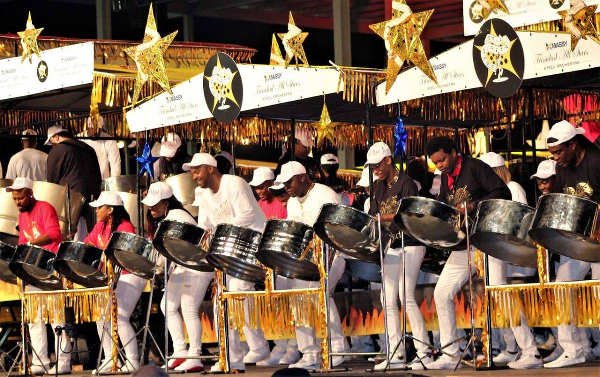Trinidad All Stars Steel Orchestra (All Stars) unconditionally qualifies for recognition as an institution because it has consistently served broader societal functions beyond the performance of musical works on pan.
These broader societal functions include cultural innovation and preservation, education and community development.

(via Island Talks)
Many other steel orchestras (commonly referred to as a steelbands) that have institutional quality are similarly deserving of tribute in that regard; but this column is a review of A Bukka Rennie’s excellent book entitled Mettle and Metal – The Birth of Steel Band Music and the Story of Trinidad All Stars Steel Orchestra.
The author never misses a beat. The title of the book links the mettle of the inventors and exponents of pan and the metal of the instrument.
This is an insightful link because the inventors and innovators were essentially scientists skilled in metallurgy and acoustics. Consequently, Trinidad and Tobago has a significant scientific patrimony derived from the invention of pan. The book enhances our understanding of that scientific patrimony.

(via OTP)
Bukka puts the history of All Stars on a vast canvas. Chapter one begins with the history of the mid-1800s and includes telling us of the Alguazils, those “free coloureds” forced to be policemen—employed to do the discriminatory work of the colonial police and other persons who maintained the significant hostility shown to the people’s culture.
By the time the book closes at chapter six, we have had a detailed account of all that happened in the east Port of Spain area taking the development of our unique form of music forward, out of the creative use by percussionists of discarded pieces of steel and iron and other material into pan as it is today.
Bukka deals as well with reforming the administrative structure of the institution and states the case for making Port of Spain the creative city of the English-speaking Caribbean.

(via Ministry of Tourism, Culture and the Arts)
Bukka’s passion for All Stars leaps off the pages. It is a counterpoint to the scholarship richly embedded in the book.
A main focus of the book is a description of the work and leadership of the late Neville Jules, the lynchpin of All Stars, in both development of and innovation with the instrument and the arrangement of All Stars’ music.
His passion overflows in his dedication of the book to Jules together with the reproduction of his award-winning poetry about Jules.

Bukka alleges a disregard of Jules which he pungently describes. I share his view that the legacy of Jules has not been properly recognised. Jules introduced the dropping of a musical “bomb” on Jour Ouvert morning, which is the performance of a classical or popular tune at a designated spot in the midst of the abandon of that morning.
Currently, there is evidence of the disregard of which Bukka speaks in the neglect by Pan Trinbago to renew and re-invest in the Bomb competition. This is particularly important in an effort to keep pan on the road for Carnival.
Another major strength of this book is the identification of the whole panoply of All Stars’ innovators, band captains, pan musicians and arrangers, hard-working supporters and even some “badjohns”—accompanied by fascinating tales of their exploits and very many photographs.

(Copyright Government Information Services via panonthenet.com)
No detail is spared in recognizing and documenting the work and role of persons connected with the creativity of east Port of Spain and All Stars.
In addition, Bukka references those nationally recognised musicians who worked with pan, such as (to mention just two) Jerry Jemmot (“Uncle Jem”) and June Nathaniel. From Bukka’s detailed documentation one can also take pride in the mention of relatives and friends, as I was moved to see my friend Gideon Harris recognized in the section in memoriam.
A wealth of insight into pan creativity abounds. For example, there is the inside story of the return of the renowned arranger Leon “Smooth” Edwards with ‘Curry Tabanca’ to triumph at the international Panorama in 2015 “with a more musically mature use of tassa drums”.

Photo: Allan V Crane/ Wired868
Twenty-eight years earlier, “Smooth” had introduced tassa drums into Panorama with that tune of choice but All Stars did not win.
Every lover of pan, even if passionately invested in a rival band, should read this book. It is a truly impressive achievement.
Martin G Daly SC is a prominent attorney-at-law. He is a former Independent Senator and past president of the Law Association of Trinidad and Tobago.
He is chairman of the Pat Bishop Foundation and a steelpan music enthusiast.

